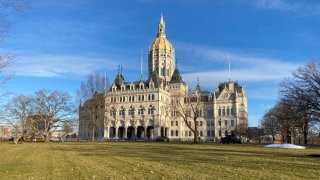
The Connecticut State Capitol in Hartford.
Tax cuts, criminal justice reform, and the future of COVID-19 restrictions are among the host of issues Connecticut lawmakers are expected to take up when the 2022 legislative session convenes on Wednesday.
It will mark the third year in a row the General Assembly will need to complete its work during a continuing pandemic. Lawmakers expect to hold virtual meetings during at least the month of February.
But unlike the two past legislative sessions, this year Democratic Gov. Ned Lamont is facing reelection in November, as well as the entire Democratic-controlled General Assembly, and politics are expected to play a larger role in the three-month-long session. Already, it appears some of the issues will likely spill over into the governor’s race.
Here’s what to expect:
Get Connecticut local news, weather forecasts and entertainment stories to your inbox. Sign up for NBC Connecticut newsletters.
Tax Cuts
Lamont is scheduled to present state legislators with proposed changes to the two-year $46.3 billion state budget enacted last year. Considering the state is projecting to have a $1.48 billion operating surplus by the end of the current fiscal year, both Lamont and Republicans have proposed tax reductions.
Lamont last week unveiled a five-part plan that includes expanding eligibility for the state’s property tax credit against the personal income tax; capping local property taxes on motor vehicles; speeding up the planned, phased-in exemption of income earned from pensions and annuities from the personal income tax; and expanding eligibility for a student loan tax credit program for employers who help pay off their workers’ loans.
Local
Meanwhile, Senate Republicans have already proposed temporarily reducing the Connecticut sales tax rate to help families impacted by inflation. They’ve called for cutting the tax from 6.35% to 5.99% and eliminating the additional 1% meals tax from February 15 through the end of calendar year 2022.
Lamont’s anticipated Republican rival in the governor’s race, Madison businessman Bob Stefanowski, has criticized the governor’s plan for falling short of what’s needed to make Connecticut more affordable. He has also called for cutting the sales tax, eliminating the tax on food and restaurants, and making gas less expensive.
The Connecticut Business and Industry Association criticized the governor’s plan for not doing enough to help businesses, many of which are struggling with the labor shortage and continuing impacts of the pandemic. CBIA has proposed a number of initiatives, including exempting safety apparel and personal protective equipment from the sales tax and using more federal coronavirus relief funds to lower the state unemployment fund’s estimated $1 billion debt that businesses will ultimately have to repay.
“Too many of Connecticut’s small businesses—critical to our recovery prospects—are struggling and desperately need help addressing the labor shortage, inflation, pending tax hikes to pay off the state’s unemployment fund debt, and numerous other challenges,” CBIA president and CEO Chris DiPentima said in a statement.
COVID-19 Restrictions
One of the first tasks state legislators face when the session convenes is deciding what to do about the governor’s roughly 12 remaining executive orders, which are set to expire when his public health and civil preparedness emergencies expire on Feb. 15. The list includes some controversial measures, including face mask and vaccination requirements.
A vote to extend some of Lamont’s orders could come in the early days of the session. On Wednesday, the governor suggested there may be changes to mask-wearing rules in schools.
“Well, if the numbers keep going in the right direction, we’re going to have a really robust conversation with the Legislature over the next week. Let’s see where we are a few days from now, but there could be some changes coming,” he said. However, Lamont still wants the state Department of Education to have the ability to reinstate mask-wearing if it becomes necessary.
Other Issues
Even though the legislative session is abbreviated this year, given the November elections, legislators are expected to still debate a wide range of topics, including juvenile crime. While some Democrats argue there is a pandemic-driven uptick in certain criminal activity in Connecticut that all states have experienced, Republicans contend there’s been a surge in violent crime specifically in Connecticut that must be addressed this session.
“Connecticut must act to make our state a safer place. We need action,” said state Senate Minority Leader Kevin Kelly, R-Stratford.
Meanwhile, expect lawmakers to debate how the state should spend a remaining $232 million in federal COVID-relief funds, a figure that will likely change after Lamont releases his state budget proposal.
They’re also likely to discuss how best to spend $5.38 billion in federal funding Connecticut expects to receive over the next five years; whether to set aside more federal funds to improve ventilation in schools; how to help financially struggling nonprofit community organizations; whether to help terminally ill patients die; how to address various labor shortages; whether to ban flavored vaping products; how to address racial disparities in public health; and whether to try again to impose limits on isolation in prisons after Lamont vetoed such a bill last year, among other issues.